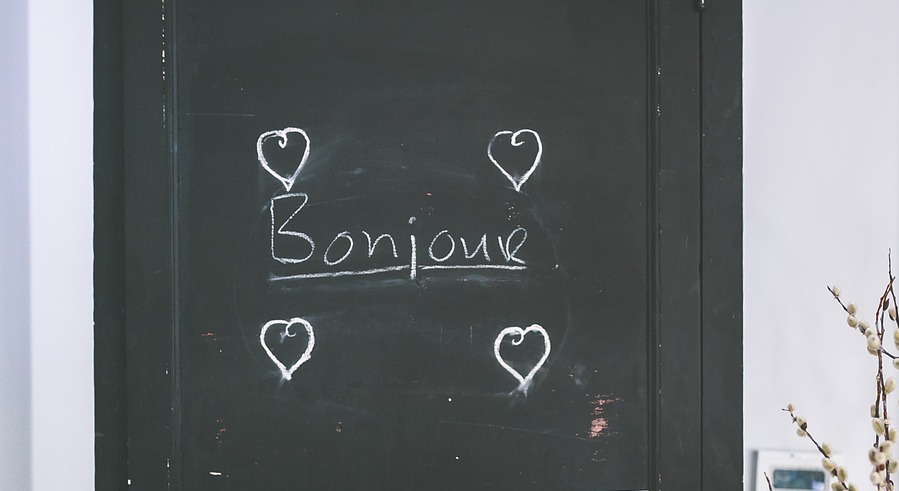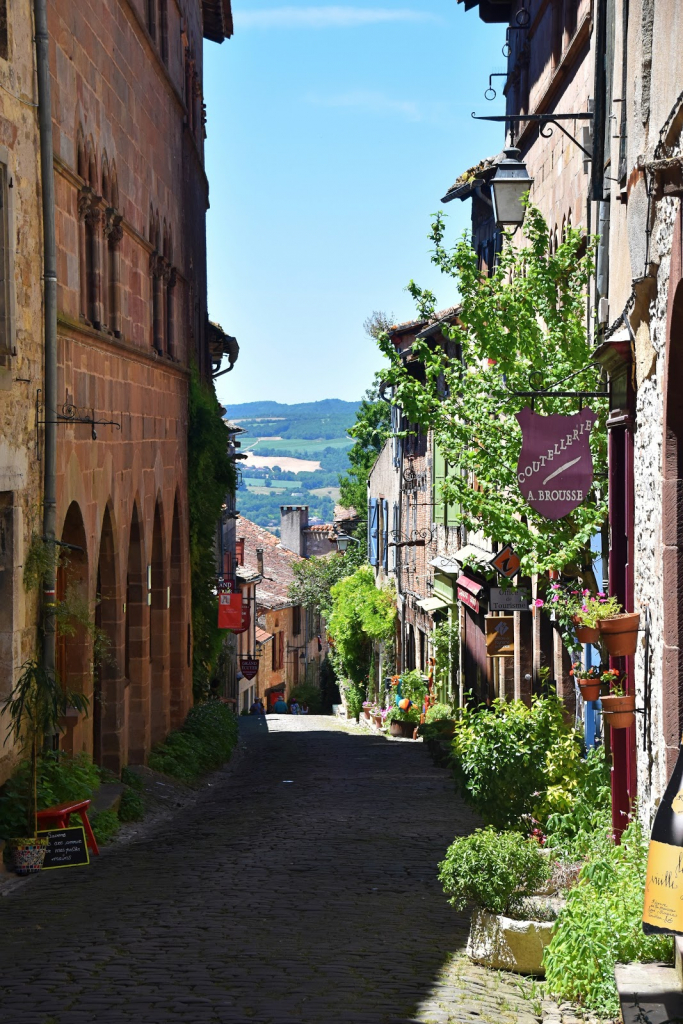Did you know that French is the official language of over 20 countries worldwide? As a matter of fact, there are nearly 30 countries in the world today in which you will hear the French language being spoken. In our ‘Talk the Talk’ articles, we cover the basic phrases you will need to be able to speak when traveling to France or another country. Here we have laid out some fundamental French words and phrases along with their phonetic pronunciations to get you started or to serve as a refresher.
Whether you are taking a trip during your sabbatical to explore the French Riviera, dine out in Brussels, or visit Montreal – these 40 basic French phrases are sure to help you get around your sabbatical destination. Who knows, maybe you will decide to learn French in its entirety and go back home speaking an entirely new language!
“Paris is the city in which one loves to live. Sometimes I think this is because it is the only city in the world where you can step out of a railway station—the Gare D’Orsay—and see, simultaneously, the chief enchantments: the Seine with its bridges and bookstalls, the Louvre, Notre Dame, the Tuileries Gardens, the Place de la Concorde, the beginning of the Champs Elysees—nearly everything except the Luxembourg Gardens and the Palais Royal. But what other city offers as much as you leave a train?”
– Margaret Anderson (1965)
Common French Phrases For Travel
1. How to Say Yes in French
“Yes” in French is: Oui
“Yes” in French is pronounced: Wee
2. How to Say No in French
“No” in French is: Non
“No” in French is pronounced: Nong
3. How to Say Why in French
“Why” in French is: Pourquoi
“Why” in French is pronounced: Poor-kwah
4. How to Say Me in French
“Me” in French is: Moi
“Me” in French is pronounced: Mwah
5. How to Say You in French
“You” in French is: Tu/Vous
“You” in French is pronounced: Too/Vouz
6. How to Say How are You in French
“How are you” in French is: Comment ça va
“How are you” in French is pronounced: Kom-mohn sa-va
7. How to Say Yes Please in French
“Yes please” in French is: Oui, s’il vous plaît
“Yes please” in French is pronounced: Wee, seel voo play
8. How to Say No Thank you in French
“No thank you” in French is: Non, merci
“No thank you” in French is pronounced: Nong, mair-see
9. How to Say Good in French
“Good” in French is: Bien
“Good” in French is pronounced: Bi-yen
10. How to Say Friend in French
“Friend” in French is: Ami (masculine) Amie (feminine)
“Friend” in French is pronounced: Ah-mee
11. How to Say What is Your Name in French
“What is your name” in French is: Comment vous appellez-vous?
“What is your name” in French is pronounced: Kom-mohn voo-za-peh-lay voo
Related: Member Spotlight: Shep Steiner Shares Tips for Canadian Families on Sabbatical in France
French Greeting Phrases

12. How to Say Hello in French
“Hello” in French is: Salut
“Hello” in French is pronounced: Sa-loo
13. How to Say Good Morning in French
“Good Morning” in French is: Bonjour, (madame/monsieur)
“Good Morning” in French is pronounced: Bong-zhoor, (mah-dahm/mer-syer)
14. How to Say Good Afternoon in French
“Good afternoon” in French is: Bonne après-midi (madame/monsieur)
“Good afternoon” in French is pronounced: Bon ap-ge mee-dee (mah-dahm/mer-syer)
15. How to Say Good Evening in French
“Good Evening” in French is: Bonsoir (madame/monsieur)
“Good Evening” in French is pronounced: Bon sou-ar (mah-dahm/mer-syer)
16. How to Say Goodnight in French
“Good Night” in French is: Bonne nuit (madame/monsieur)
“Good Night” in French is pronounced: Bon nou-ee (mah-dahm/mer-syer)
French Farewell Phrases

17. How to Say Goodbye in French
“Goodbye” in French is: Au revoir
“Goodbye” in French is pronounced: Oh ruh-vwar
18. How to Say See You Later in French
“See you later” in French is: À tout à l’heure.
“See you later” in French is pronounced: Ah too tah leuhr
19. How to Say See You Soon in French
“See you soon” in French is: À bientôt
“See you soon” in French is pronounced: Ah bee yen toe
French Etiquette Phrases

20. How to Say Excuse me in French
“Excuse me” in French is: Excusez-moi
“Excuse me” in French is pronounced: Ex-kew-zay mwah
21. How to Say No Problem in French
“No Problem” in French is: Aucun problème
“No Problem” in French is pronounced: Oo-kun prob-lem
22. How to Say You’re Welcome in French
“You’re welcome” in French is: De rien
“You’re welcome” in French is pronounced: De ri-yen
23. How to Say Bless You in French
“Bless you” in French is: A vos souhaits (formal) A tes souhaits (informal)
“Bless you” in French is pronounced: Ah vo sway, ah te-sway
24. How to Say Have a Good Day in French
“Have a good day” in French is: Bonne journée
“Have a good day” in French is pronounced: Bun zhoor nay
Related: Founder on the Move: Meeting Daniel Andler in France
Basic French Phrases To Help You Get Around

25. How to Say Do you Speak English in French
“Do you speak English” in French is: Est-ce que vous parlez anglais?
“Do you speak English” in French is pronounced: Essker voo pahrlay ahng-glay
26. How to Say Can you Help Me in French
“Can you help me” in French is: Est-ce que vous pouvez m’aider?
“Can you help me” in French pronounced: Essker voo poovay may-day
27. How to Say Where is in French
“Where is” in French is: Où est…?
“Where is” in French is pronounced: Oo ay…
28. How to Say How Much in French
“How much” in French is: Combien?
“How much” in French is pronounced: Kom-bee-yan
29. How to Say What is That in French
“What is that” in French is: Qu’est-ce que c’est?
“What is that” in French is pronounced: Kess-ku say
30. How to Say I Don’t Understand in French
“I don’t understand” in French is: Je ne comprends pas
“I don’t understand” in French is pronounced: Juh-nuh kom-prohn pah
31. How to Say “How do you say ___ in French”
“How do you say ___ in French” is: Comment dites-vous ___ en français
“How do you say ___ in French” is pronounced: Kom-mohn dite-vouz ___ un fran-say
32. How to Say Could You Repeat That Please in French
“Could you repeat that please” in French is: Pourriez-vous répéter cela, s’il vous plait
“Could you repeat that please” in French is pronounced: Pou-rie voo re-pe-te se-la, seel voo play
33. How to Say Just a Moment in French
“Just a moment” in French is: Juste un moment
“Just a moment” in French is pronounced: Just oon moment
34. How to Say It Hurts Here in French
“It hurts here” in French is: Ça fait mal ici
“It hurts here” in French is pronounced: Sa fet mal isi
35. How to Say “I’m Sorry to Bother You, But” in French
“I’m sorry to bother you, but” in French is: Désolé de vous déranger, mais
“I’m sorry to bother you, but” in French is pronounced: De-zu-lay de voo deh-rhan-jay may
36. How to Say Where is the Closest Supermarket in French
“Where is the closest supermarket” in French is: Ou se trouve l’épicerie la plus proche?
“Where is the closest supermarket” in French is pronounced: Ou say trouve le pes-sie la plu pr-osh
French Housing-Related Phrases

37. How to Say Do You Have an Extra Key in French
“Do you have an extra key” in French is: Avez-vous une clé supplémentaire
“Do you have an extra key” in French is pronounced: Avez-vouz oon kle supplementer
38. How to Say Are Utilities Included in French
“Are utilities included” in French is: Est-ce que les charges sont comprises dans le loyer? (eau, électricité, gaz, taxes, assurances)
“Are utility rates included” in French is pronounced: Essker le sch-agh son kom-prees dun le loua-yer (oo, ele-ktri-si-te, gaz, tax, asu-rans)
39. How to Say How Much Does the Connection to the Internet Cost in French
“How much does the connection to the Internet cost” in French is: Combien coute la connexion internet?
“How much does the connection to the Internet cost” in French is pronounced: Kom-bee-yan koot la co-nek-sion internet
40. How to Say Is There Something I Should Know About the Neighborhood in French
“Is there something I should know about the neighborhood” in French is: Y a-t-il quelque chose que je devrais savoir sur le quartier?
“Is there something I should know about the neighborhood” in French is pronounced: I-ya til kiel-ke shuz kur je devray savoo-ah sur le kar-tiay
French Speaking Countries
There are over 275 million people in the world who speak French, with French being spoken in 29 countries worldwide. Below we have compiled a list of these countries that are known to incorporate French into daily dialogue. Looking through this list of countries, it is clear that being familiar with basic French phrases is very helpful if you are planning to take a sabbatical to any of these countries or perhaps travel and explore any of them during your sabbatical leave.
- Belgium
- Benin
- Burkina
- Burundi
- Cameroon
- Canada
- Central African Republic
- Chad
- Comoros
- Congo
- Congo, Democratic Republic of
- Côte d’Ivoire
- Djibouti
- France
- Gabon
- Guinea
- Haiti
- Luxembourg
- Madagascar
- Mali
- Monaco
- Niger
- Rwanda
- Senegal
- Seychelles
- Switzerland
- Togo
- Vanuatu
- Vietnam
Related: The Traveling Family: Lyon, France

History of the French Language
Did you know that French is predicted to be spoken by 750 million people worldwide by the year 2050? French is currently the sixth most widely spoken international language; but how did the French language originate? When traveling to any country, being aware of some of the key history behind the language is a plus. French is known to be a language of Roman descent and is actually one of the five universal romance languages, along with Portuguese, Spanish, Italian and Romanian. In contrast to what it may seem, the term “romance language” literally translates to “romanica loqui,” meaning in a “Roman fashion.”
History of French Language: The Birth
French is one of the richest languages in the world, as is the history behind the language and how it came into existence. The French language originated in Gaul, an ancient Western European region. The language that was spoken in that region was an ancient Celtic language known as the Gaulish language. Although the Gaulish language does not directly impact the modern French that is spoken in dialogue today, it is important in understanding the true origins of French and how the language came into existence.
During the 2nd and 1st centuries BC, the region of Gaul was conquered by the Romans. It was during this time that the Gaulish language began to fade, as the Romans enforced Latin (which gradually replaced Gaulish). Interestingly, it is for this reason that French is considered a “romance” language, meaning “to be spoken in Roman fashion.” In essence, French evolved as a result of the Gallo-Romance dialects which were originated in Gaul.
Despite the gradual fade of the Gaulish language and its several dialects, the influence of the Gaulish language can be seen by at least 150 Gaulish words used in present-day Latin and about 70 Gaulish words used today in present-day French.
The Roman conquest of the region of Gaul was followed by the Germanic invasion, also referred to by the Romans as the “barbaric invasions.” This invasion created a merging between the Gallo-Roman population that had been formed and the German invaders of the region. It is precisely from this merging of Latin and Germanic roots that the French language was formed.
It is quite fascinating to think about how despite the fading and disappearance of languages or dialects, so many dialects and languages worldwide tend to be interconnected and influenced by one another, even until today.
History of French Language: Latin Influence and French Grammar
Now that we have discussed a little bit about how the French language originated and really came into existence, let’s talk about the more direct influence that Latin had in the origins of French. Modern-day French currently holds a great deal of evident Latin roots. As a matter of fact, the Latin root of the French language makes it a language that English speakers especially can get a head-start with.
The French alphabet incorporates the 26 letters of the basic Latin script; however, the phonology of French is quite different from that of Latin and is in fact differentiated from the other five Romance languages. Additionally, despite being a Romantic language with Latin influence, modern French grammar has been simplified substantially. Understanding the fundamental history of French is important in understanding the language, and French-speaking communities respectively. Plan a beautiful trip during your sabbatical to a French-speaking country today.
Related: Taking a Sabbatical? What You Need to Know
Learn basic phrases in a foreign language to help ease traveling to another country. Let us know what you think! Connect with us on Twitter, LinkedIn, Facebook, Instagram, YouTube and Pinterest.


